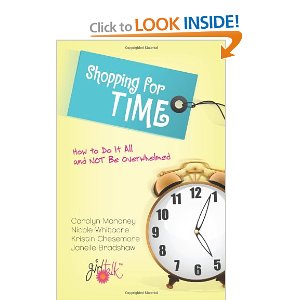 Last weekend I had the joy of watching our junior high pastor’s kids as he and his wife led a cadre of young people to winter camp. I happened to arrive when the little ones were already down for their nap, and after I said “goodbye” to their previous babysitter realized that all my stuff was still in the car and would have to stay there until naps ended. Since I’m not a fan of wasting time, I quickly tried to figure out a way that I could be productive. As I searched I happened to see “Shopping for Time: How To Do It All And Not be Overwhelmed” sitting on their bookshelf. Considering the circumstance it seemed like an appropriate read.
Last weekend I had the joy of watching our junior high pastor’s kids as he and his wife led a cadre of young people to winter camp. I happened to arrive when the little ones were already down for their nap, and after I said “goodbye” to their previous babysitter realized that all my stuff was still in the car and would have to stay there until naps ended. Since I’m not a fan of wasting time, I quickly tried to figure out a way that I could be productive. As I searched I happened to see “Shopping for Time: How To Do It All And Not be Overwhelmed” sitting on their bookshelf. Considering the circumstance it seemed like an appropriate read.
I had heard of this book for a while and know that many people extolled its benefits. Carolyn Mahaney and her daughters tackle the difficulties that women in particular often face in managing all their different commitments. The book is a short, easy read, and does contain many helpful tidbits. I didn’t find any of it revolutionary, and perhaps, as someone who tends to manage their time well this isn’t surprising. The part of the book that I had heard the most about – the 5 o’clock club – seemed pretty blasé in light of my normal routine.
However, there is another reason that I think that I may have not been the target audience for the book and that is because it tended to focus on mothers – specifically mothers with younger children. This isn’t to say that the authors never acknowledged people in other life stages – they did, but many of the situations that they referred to, as well as the advice they extolled were geared for this group. That being said, women in other life stages would still find the book helpful, especially if they are struggling with how to make the most of their time in each day.
The section of the book that was most meaningful to me was on the need to often choose between the good things that we could do, and the best things that we can do. For many women a lack of options is not the issue – but how to choose wisely is. This book provides some encouragement as well as advice on how to do just that. As the title suggests, the book uses the analogy of shopping to explain these and other principles and as such does a good job of engaging its audience and providing an enjoyable read.
If you are struggling with time management or a feeling of overwhelmingness in how to manage all of life priorities, Shopping for Time is a good place to start. It may not provide everything you need to create a new plan, but if you incorporate its principles it will jumpstart you down the right path.
[This post contains affiliate links.]
